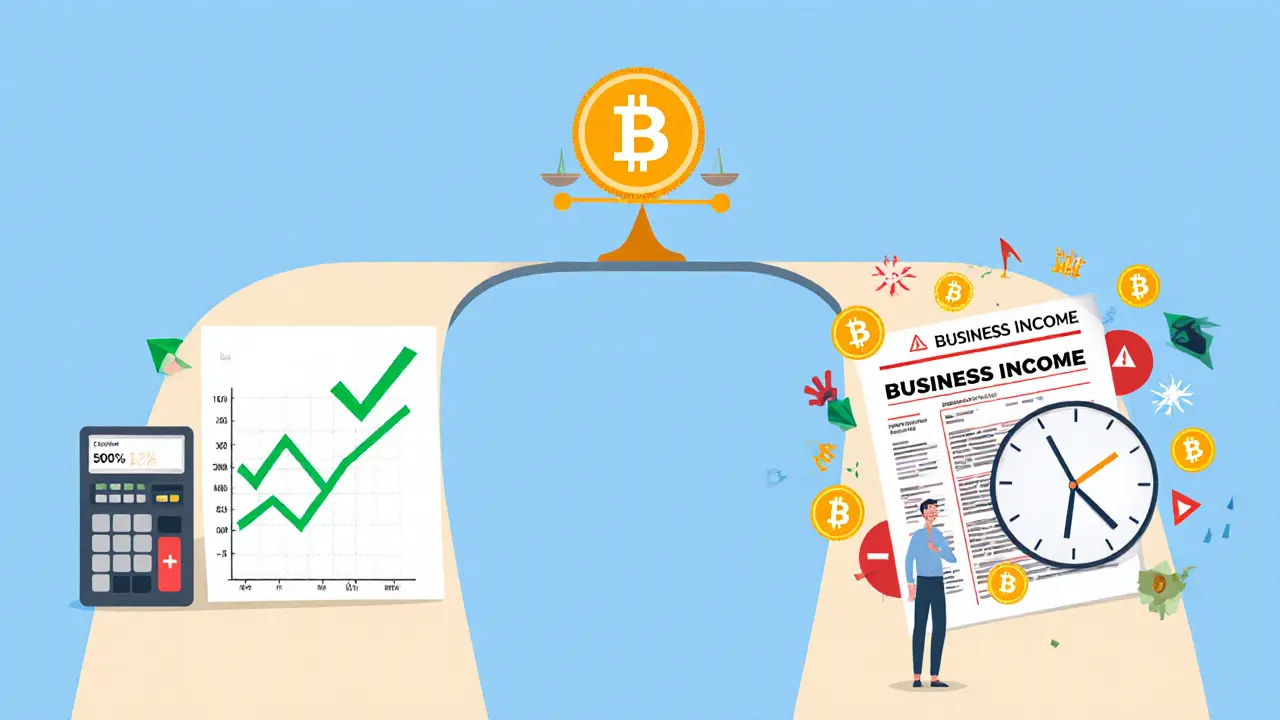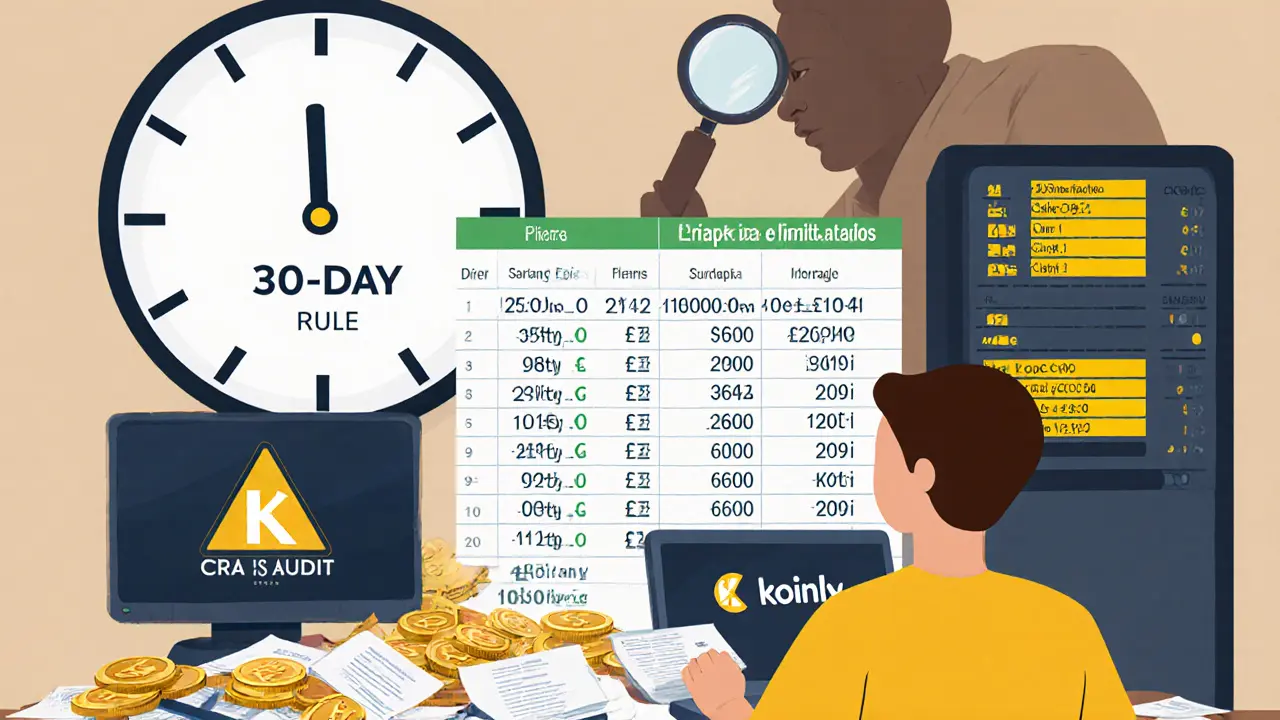
Canadian Crypto Tax Calculator 2025
Calculate Your Crypto Tax Liability
Buying Bitcoin in Canada doesn’t trigger a tax bill. But selling it? That’s when the Canada Revenue Agency (CRA) steps in. If you’ve traded, sold, or used crypto to buy anything, you owe taxes. And if you mined, staked, or got airdrops, you’re on the hook for income tax too. The CRA doesn’t treat cryptocurrency like cash. It treats it like property. That means every time you move crypto - even swapping one coin for another - you might have to pay tax. For 3.2 million Canadians who own crypto, this isn’t optional. It’s law.
How the CRA Classifies Crypto: Property, Not Currency
The CRA made this clear back in 2013, and it hasn’t changed. Cryptocurrency isn’t money. It’s not foreign currency. It’s a digital asset - a commodity. That means every transaction involving crypto is treated like selling a stock, a car, or a piece of art. You don’t pay tax when you buy Bitcoin with Canadian dollars. You pay tax when you sell it, trade it, or use it to buy coffee. The moment you dispose of it, the tax clock starts ticking.
This isn’t just theory. In 2025, the CRA released draft legislation reinforcing this stance. They’re cracking down on people who think holding crypto is tax-free forever. The message is simple: if you didn’t report your trades, you’re at risk.
Two Ways Crypto Gets Taxed: Capital Gains vs. Business Income
There are only two ways your crypto profits get taxed in Canada: as capital gains or as business income. The difference matters - a lot.
Capital gains apply if you bought crypto as an investment. You hold it, wait for it to go up, then sell. Only 50% of your profit is taxable. So if you bought $10,000 worth of Ethereum and sold it for $25,000, your gain is $15,000. The CRA taxes only $7,500 of that. That’s your taxable capital gain.
Business income applies if you’re trading frequently, running a mining operation, or getting paid in crypto for services. In this case, 100% of the value is taxable. If you mine Bitcoin and sell it for $20,000, the full $20,000 is added to your income. No 50% discount. No breaks.
How does the CRA decide which category you’re in? They look at your behavior. Did you trade 50 times in a year? Did you use automated bots? Did you quit your job to trade full-time? If yes, you’re likely running a business. And that means higher taxes.
What Counts as a Taxable Event?
Not every crypto action triggers tax. Here’s what does:
- Selling crypto for Canadian dollars
- Trading one crypto for another (e.g., BTC for ETH)
- Using crypto to buy goods or services
- Receiving crypto as payment for work or services
- Getting crypto from mining, staking, or airdrops
- Receiving crypto as a reward from a platform (like Coinbase Earn)
Here’s what doesn’t:
- Buying crypto with CAD
- Holding crypto without selling
- Transferring crypto between your own wallets
- Receiving crypto as a gift (but selling it later triggers tax)
That last one trips people up. If your uncle sends you 0.5 BTC as a gift, you don’t pay tax then. But if you sell it for $30,000, you owe tax on the full gain - based on the fair market value at the time you received it.
How Much Tax You Actually Pay
Canada uses a progressive tax system. The more you earn, the higher your rate. For 2025, federal rates are:
- 15% on income up to $55,867
- 20.5% on income between $55,868 and $111,733
- 26% on income between $111,734 and $173,205
- 29% on income between $173,206 and $246,752
- 33% on income over $246,752
Then add provincial taxes. In Ontario, for example, you pay up to 13.16% extra on top of federal. In Quebec, it’s even higher - up to 25.75% on income over $121,375.
Let’s say you’re in Ontario and made $100,000 in capital gains from crypto. You pay tax on half of that - $50,000. Your federal tax on $50,000 is about $9,000. Your provincial tax is about $4,300. Total: $13,300.
Now, if that same $100,000 was business income, you pay tax on the full amount. Federal tax: $22,000. Provincial tax: $10,000. Total: $32,000. That’s nearly triple the tax.

Tax Loss Harvesting: Legal, But With Rules
Lost money on crypto? You can use that to reduce your tax bill. This is called tax loss harvesting. Sell a coin at a loss, and use that loss to offset gains you made elsewhere.
But there’s a catch: the superficial loss rule. If you sell Bitcoin for a loss and buy it back - or buy a similar coin - within 30 days before or after, the CRA ignores the loss. It’s disallowed. You can’t just sell and rebuy to claim a deduction.
Also, only 50% of your capital loss is deductible. If you lost $10,000, you can only use $5,000 to offset gains. That’s the same as the capital gains inclusion rate. So if you had $15,000 in gains and $10,000 in losses, your taxable gain is $10,000 - not $5,000. Because $5,000 of your loss is disallowed.
People who do this right save thousands. Those who ignore the 30-day rule get audited.
How to Report Crypto on Your Tax Return
You report crypto gains on Schedule 3 of your T1 tax return. That’s where you list capital gains and losses. You need to calculate your adjusted cost base (ACB) - what you paid for the crypto, including fees - and your proceeds of disposition - what you got when you sold it.
Business income from mining or staking goes on Form T2125. You report revenue and expenses. Electricity for mining? Deductible. Hardware depreciation? Deductible. Software subscriptions? Deductible.
Here’s the kicker: you need records for every transaction. Date, amount, value in CAD, what you bought or sold, and the platform. If you used 3 exchanges, 2 wallets, and 1 DeFi protocol, you’ve got a spreadsheet with hundreds of lines.
Most people use crypto tax software. Koinly and CoinLedger are popular because they pull data directly from exchanges and generate CRA-ready reports. TurboTax Canada’s crypto tools? Many users say they’re incomplete. The software can’t handle complex DeFi trades or cross-chain swaps. If you’re doing anything beyond simple buys and sells, don’t trust TurboTax alone.
What Happens If You Don’t Report
The CRA is watching. Crypto audits rose 37% from 2023 to 2024. They’re cross-referencing exchange data with tax returns. If Wealthsimple reports you sold $50,000 in crypto and you didn’t report it - you’re on their radar.
Penalties are steep:
- 5% of the tax owing, plus 1% per full month late (up to 12 months)
- 10% of the tax owing if the CRA finds gross negligence
- Reassessment of past returns - up to 10 years back
- Interest charges on unpaid taxes
In 2025, the CRA’s own audit review found that 73% of crypto tax returns had material errors. The top mistakes? Wrong cost basis (42%), calling capital gains business income (31%), and ignoring foreign exchange activity (27%).
Don’t think you’ll get away with it. The CRA has access to data from Canadian exchanges. They’re also working with international agencies to track off-shore activity.

What’s Changing in 2025 and Beyond
Canada is moving toward more transparency. The August 2025 draft legislation proposes mandatory reporting for all crypto transactions over $10,000. That’s similar to the U.S. IRS rules. Exchanges will have to report these to the CRA. That means even if you think you’re hiding behind a foreign exchange, the CRA will know.
By 2027, the Department of Finance estimates these new rules will bring in $285 million extra in tax revenue each year. That’s not small change. It’s a signal: compliance is coming.
Meanwhile, 87% of major Canadian exchanges - Wealthsimple, Coinsquare, Bitbuy - now provide CRA-compliant tax statements. That’s up from 62% in 2022. The tools are here. You just need to use them.
Real People, Real Mistakes
On Reddit, one user spent 47 hours preparing their 2024 crypto taxes after trading across five exchanges. They called it a "bureaucratic nightmare." Another saved $3,200 by harvesting losses and staying within the 30-day rule.
A 2025 Abacus Data survey found 54% of Canadian crypto owners feel unprepared. 29% admitted to incomplete reporting on their last return. That’s nearly one in three people risking penalties.
And tax professionals? 68% of CPA Canada’s survey respondents say the system is too complex for average people. But that doesn’t mean you get a pass. The law still applies.
What You Should Do Now
Here’s your checklist for 2025:
- Collect all transaction records from every exchange and wallet you used.
- Use crypto tax software (Koinly or CoinLedger recommended).
- Classify each transaction: capital gain or business income?
- Calculate your adjusted cost base for every coin you own.
- Check for superficial losses - don’t rebuy within 30 days.
- Report capital gains on Schedule 3, business income on T2125.
- Keep records for six years. The CRA can audit you anytime.
If you’re unsure, hire a tax pro who specializes in crypto. Don’t guess. The cost of a mistake is far higher than the cost of a consultation.
The rules aren’t going away. They’re getting stricter. The question isn’t whether you’ll be taxed - it’s whether you’ll pay the right amount.
Vanshika Bahiya
14 11 25 / 16:08 PMJust wanted to say this guide is a lifesaver for folks like me who are new to crypto and living abroad. I’m in India and was totally confused about how to report my Bitcoin trades. This broke it down so clearly - especially the part about capital gains vs. business income. I used Koinly and it actually worked for my multiple wallets. Thank you for making this feel less intimidating. 🙌
Albert Melkonian
16 11 25 / 10:32 AMWhile the information presented is largely accurate and aligns with current CRA interpretations, I would respectfully suggest that the distinction between capital gains and business income warrants further elaboration regarding the objective criteria used in audit assessments. The CRA’s guidance, particularly Interpretation Bulletin IT-479R, emphasizes transaction frequency, holding period, and intent as primary determinants - factors often conflated in popular discourse. A more nuanced discussion of precedent cases would enhance the utility of this resource for taxpayers navigating gray areas.
Kelly McSwiggan
16 11 25 / 13:38 PMOh wow, another ‘complete guide’ that somehow forgets to mention that 90% of crypto users are just trying to avoid paying taxes and the CRA is too busy counting their own coffee beans to notice. Let me guess - you also think the 30-day rule is some kind of magic loophole? Newsflash: the CRA has bots that track your MetaMask transactions better than your ex tracks your Instagram stories. Good luck with that $3,200 ‘savings’ when you get flagged for ‘pattern of trading behavior.’
Byron Kelleher
18 11 25 / 10:00 AMMan, I read this and I actually felt hopeful. Like, yeah, it’s a mess - but it’s a mess we can fix. I used to stress about every tiny trade, but now I just track everything in a Google Sheet and use Koinly to double-check. No need to panic. Just be consistent. And if you’re not sure? Talk to someone who’s done it before. Seriously, you don’t need to be a tax genius. Just organized. And maybe a little patient. 🤝
Cherbey Gift
19 11 25 / 17:45 PMAh, the sacred algorithm of capital gains - where digital gold becomes a tax oracle whispered by bureaucrats in Ottawa who’ve never even seen a blockchain! We trade tokens like modern-day alchemists, turning Ether into tax liability, turning memes into mandatory filings. The CRA doesn’t see Bitcoin - they see a ledger of human dreams, each transaction a soul crying out for validation in the cold machine of fiscal order. Are we not all just stakers in the temple of capitalism, praying to the god of depreciation schedules? 🌌
Anthony Forsythe
19 11 25 / 22:37 PMLet me tell you something - this isn’t just about taxes. This is about identity. Every time you sell a coin, you’re not just reporting a gain - you’re confronting the ghost of your own financial ambition. The 30-day rule? That’s not a regulation. It’s a mirror. Are you holding on because you believe? Or because you’re afraid to let go? I’ve seen people cry over a $200 loss because they thought they were ‘too late’ to cash out. This isn’t accounting. It’s therapy with receipts. And if you’re not crying over your ACB, you’re not doing it right.
Kandice Dondona
21 11 25 / 21:53 PMThis is so helpful!! 💖 I just finished my 2024 crypto taxes and almost cried from relief - Koinly saved my sanity! 🙏 I used to think I’d get audited just for breathing near a wallet. Now I know the rules and I’m actually proud of being compliant. To anyone scared: you got this! And if you’re stuck, just DM me - I’ll help you sort it out. We’re all in this together! 🌟
Becky Shea Cafouros
22 11 25 / 18:21 PMThe article is technically correct but lacks practical nuance. Most individuals do not have the resources to track every micro-transaction across DeFi protocols, and the CRA’s enforcement posture remains inconsistent. While the framework is sound, the burden of compliance disproportionately impacts casual holders. The suggestion to hire a specialist is reasonable, yet inaccessible to many. This is regulatory overreach disguised as transparency.
Drew Monrad
24 11 25 / 12:23 PMOh, so now we’re supposed to be grateful the government is watching our wallets? Canada’s crypto policy is a joke - they tax you for buying coffee with Bitcoin but won’t let you write off your GPU as a business expense unless you file a 17-page affidavit. Meanwhile, my cousin in the U.S. just mined $50k in ETH and didn’t say a word. You know why? Because the CRA is too busy auditing single moms who used Coinbase to buy Dogecoin. This isn’t fairness. It’s performance art.
Cody Leach
25 11 25 / 21:04 PMJust wanted to add - if you're using multiple wallets and exchanges, don't forget to include gas fees in your ACB. I missed that for months and it threw off my whole calculation. Also, if you're doing staking rewards, treat each reward as a separate purchase at FMV on the day you received it. Simple, but easy to overlook. This guide nailed the big picture - just be meticulous with the details.
sandeep honey
27 11 25 / 06:36 AMBro, this is wild. I traded 300 times last year and didn’t report a single one. CRA doesn’t even know my wallet address. I used Binance US and transferred to Trust Wallet. They can’t track me. You think they care about some guy in Delhi? Nah. I’m just chilling. You report, I’ll keep making money.